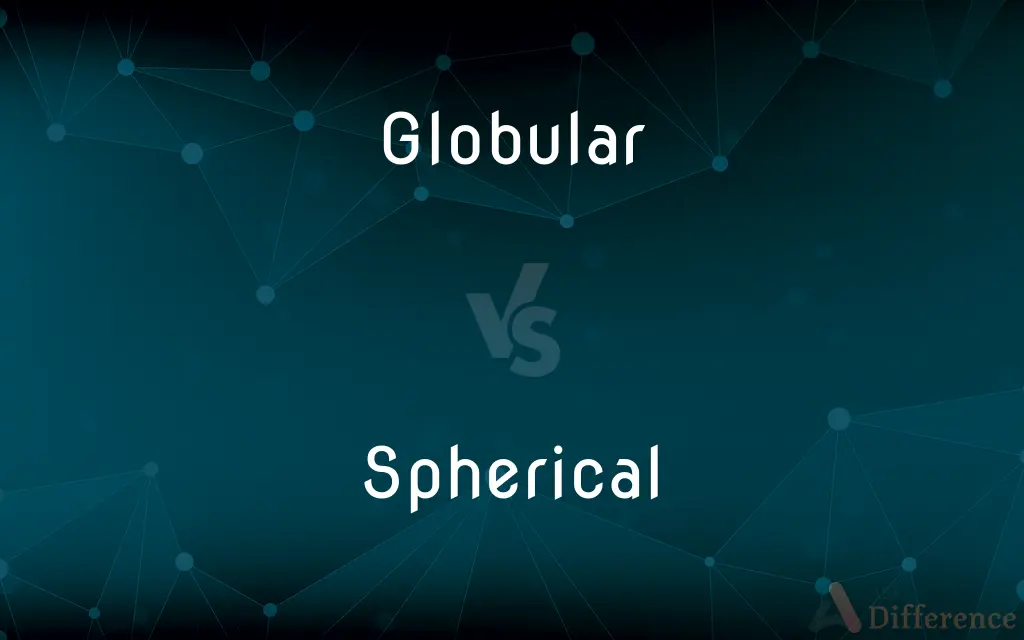Globular vs. Spherical — What's the Difference?
By Fiza Rafique & Urooj Arif — Updated on March 31, 2024
Globular shapes are like a ball but not perfectly round, often irregular, while spherical shapes are perfectly round, like a globe.

Difference Between Globular and Spherical
Table of Contents
ADVERTISEMENT
Key Differences
Globular refers to objects or forms that resemble a globe or ball but do not necessarily maintain perfect symmetry or uniformity. These shapes are often found in nature, where perfect geometrical forms are rare. Spherical, in contrast, describes a shape that is perfectly round and symmetrical in all dimensions, akin to a mathematical sphere. This term is often used in geometry, physics, and astronomy to describe objects with these precise characteristics.
While globular clusters in astronomy are groups of stars that form a roughly spherical shape, their individual components and the cluster's overall form might not be perfectly symmetrical or evenly distributed. On the other hand, planets and stars are often described as spherical due to their gravitational pull, which leads them to form shapes very close to perfect spheres, especially when viewed from a great distance.
In biology, globular proteins are complex molecules that fold into compact shapes resembling a globe, but these are not perfectly spherical due to the irregular arrangement of atoms and molecules. Spherical shapes in biology, however, are rare and usually microscopic, such as some types of pollen or bacteria, which can be approximated as spheres due to their tiny, uniform shapes.
Globular shapes often have a more organic or natural appearance, indicative of the complex and varied processes that create them. Spherical shapes, by their nature, suggest a level of perfection and uniformity that is less common in natural objects and more often a result of human fabrication or abstract mathematical concepts.
In the practical application of these terms, globular shapes might be found in everyday objects that approximate the form of a sphere but lack precise symmetry, such as certain fruits or hand-made objects. Spherical shapes, however, are strictly defined and observed in carefully manufactured objects, such as balls used in sports, or in celestial bodies under the influence of gravity, where natural forces produce near-perfect spheres.
ADVERTISEMENT
Comparison Chart
Definition
Resembling a globe but not perfectly round.
Perfectly round and symmetrical in all dimensions.
Symmetry
Often irregular or imperfect.
Perfect symmetry.
Examples
Globular clusters, globular proteins.
Planets, stars, sports balls.
Occurrence
Common in nature and organic forms.
Less common in nature, often seen in astronomy and manufactured objects.
Implications
Indicates a natural, organic process.
Suggests perfection, uniformity, or human intervention.
Compare with Definitions
Globular
Resembling a globe or ball, not perfectly round or symmetrical.
The globular shape of the pumpkin makes it interesting but challenging to carve.
Spherical
Reflecting an ideal or theoretical shape that is perfectly round, often used as a standard of comparison.
The child's drawing of the sun depicted it as a perfect spherical object, complete with rays.
Globular
In astronomy, a collection of stars bound by gravity, forming a roughly spherical shape.
The Milky Way contains several globular clusters that are densely packed with stars.
Spherical
Having the shape of a sphere; perfectly round in all dimensions.
The artist's installation featured large, spherical balloons floating above the ground.
Globular
Applied to structures or forms in biology that are compact and rounded, though not perfectly spherical.
Certain types of cells have a globular appearance under the microscope.
Spherical
Pertaining to or characteristic of a sphere, embodying perfect geometrical roundness.
The spherical design of the building minimizes wind resistance.
Globular
Relating to or having the form of a small sphere or globe, often with a somewhat irregular shape.
Many fruits, such as berries, have a globular form that appeals to a variety of animals.
Spherical
In geometry, a figure that is perfectly round, 3-dimensional, and symmetrical about all axes.
A perfect sphere has all points on its surface equidistant from its center.
Globular
Describing an object or form that is sphere-like but not perfectly round.
The ancient vase had a globular body, indicative of the potter's technique.
Spherical
Used to describe objects or celestial bodies that are round and lack irregularities.
The Earth is not a perfect sphere due to its equatorial bulge, but it is often described as spherical.
Globular
Having the shape of a globe or globule; spherical.
Spherical
Having the shape of a sphere; globular.
Globular
Consisting of globules.
Spherical
Having a shape approximating that of a sphere.
Globular
Worldwide; global.
Spherical
Of or relating to a sphere.
Globular
Roughly spherical in shape; globe-shaped.
Spherical
Of or relating to celestial bodies.
Globular
Comprising globules.
Spherical
(geometry) Shaped like a sphere.
Globular
(astronomy) A globular cluster
Spherical
Of, or pertaining to, spheres.
Globular
Globe-shaped; having the form of a ball or sphere; spherical, or nearly so; as, globular atoms.
Spherical
(mathematics) Of a coordinate system, specifying the location of a point in a plane by using a radius and two angles.
Globular
Having the shape of a sphere or ball;
A spherical object
Nearly orbicular in shape
Little globular houses like mud-wasp nests
Spherical
(astrology) Of or relating to the heavenly orbs, or to the sphere or spheres in which, according to ancient astronomy and astrology, they were set.
Spherical
Having the form of a sphere; like a sphere; globular; orbicular; as, a spherical body.
Spherical
Of or pertaining to a sphere.
Spherical
Of or pertaining to the heavenly orbs, or to the sphere or spheres in which, according to ancient astronomy and astrology, they were set.
Knaves, thieves, and treachers by spherical predominance.
Though the stars were suns, and overburnedTheir spheric limitations.
Spherical
Of or relating to spheres or resembling a sphere;
Spherical geometry
Spherical
Having the shape of a sphere or ball;
A spherical object
Nearly orbicular in shape
Little globular houses like mud-wasp nests
Common Curiosities
What defines a shape as globular?
A shape is defined as globular if it approximates the form of a globe or sphere but lacks perfect roundness or symmetry.
Why are many celestial bodies spherical?
Celestial bodies are spherical due to the force of gravity, which pulls matter into a shape that has the least surface area for a given volume, resulting in a sphere.
Can a natural object be perfectly spherical?
While natural forces like gravity can make objects such as planets and stars appear nearly spherical, perfect sphericity is rare in nature due to various physical and environmental factors.
Is the Earth perfectly spherical?
The Earth is not perfectly spherical due to its rotation, which causes an equatorial bulge, making it an oblate spheroid.
How do globular clusters differ from individual stars in shape?
Globular clusters are collections of stars forming a roughly spherical shape as a group, whereas individual stars, influenced by gravity, tend to be more perfectly spherical.
How do spherical and globular shapes differ in their mathematical properties?
Spherical shapes have specific mathematical properties related to symmetry, volume, and surface area, while globular shapes do not conform to precise mathematical definitions due to their irregularities.
What processes can create globular shapes in nature?
Processes like erosion, biological growth, and the accumulation of materials under certain conditions can create globular shapes in nature.
How does gravity affect the shape of objects in space?
Gravity tends to pull objects into a spherical shape because it acts equally in all directions, pulling matter toward a common center.
Why might an engineer prefer a spherical shape for a structure?
An engineer might prefer a spherical shape for its aerodynamic properties, strength distribution, and minimal surface area for volume, which can be beneficial in reducing materials and withstanding external pressures.
What is the significance of spherical shapes in geometry?
In geometry, spherical shapes are significant for their symmetry and mathematical properties, serving as models for studying three-dimensional space and volumes.
Are globular proteins perfectly spherical?
No, globular proteins are not perfectly spherical; they have a compact, rounded shape that is somewhat irregular due to the folding of amino acid chains.
Can the term "globular" apply to man-made objects?
Yes, the term "globular" can apply to man-made objects that resemble a sphere but do not have perfect geometric roundness.
How does the concept of spherical shape apply to the universe?
The concept of a spherical shape applies to the universe in the distribution of celestial bodies and the theoretical shape of the universe, although the latter is subject to scientific debate and investigation.
Can a sculpture be both globular and spherical?
A sculpture could be described as globular if it broadly resembles a sphere but lacks perfect symmetry; it's only spherical if it achieves perfect roundness.
What are the practical implications of designing spherical objects in engineering?
Designing spherical objects in engineering can have practical implications for minimizing resistance, ensuring even strength distribution, and optimizing space, important in fields like aerospace and architecture.
Share Your Discovery

Previous Comparison
Savant vs. Polymath
Next Comparison
Assimilation vs. CoarticulationAuthor Spotlight
Written by
Fiza RafiqueFiza Rafique is a skilled content writer at AskDifference.com, where she meticulously refines and enhances written pieces. Drawing from her vast editorial expertise, Fiza ensures clarity, accuracy, and precision in every article. Passionate about language, she continually seeks to elevate the quality of content for readers worldwide.
Co-written by
Urooj ArifUrooj is a skilled content writer at Ask Difference, known for her exceptional ability to simplify complex topics into engaging and informative content. With a passion for research and a flair for clear, concise writing, she consistently delivers articles that resonate with our diverse audience.














































